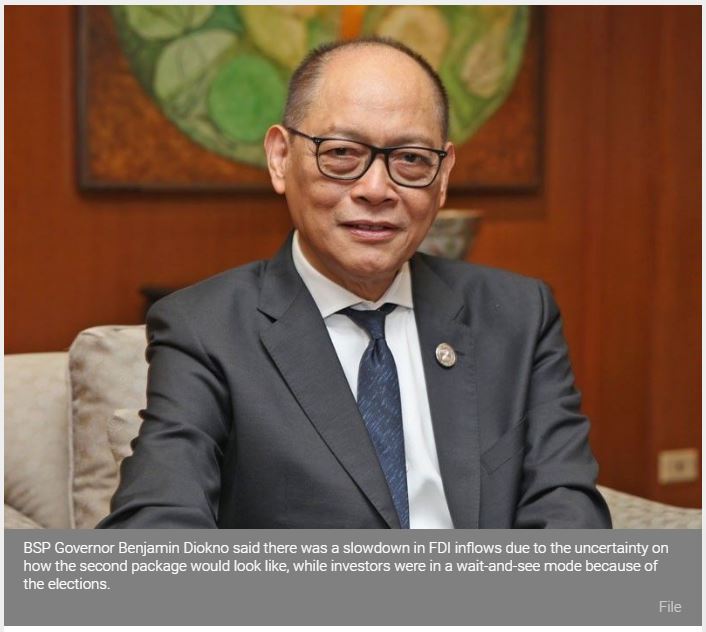Philippines: BSP sees lower FDI inflows this year
MANILA, Philippines — The Bangko Sentral ng Pilipinas (BSP) expects foreign direct investment (FDI) inflows to drop this year following a sharp decline in the first half due to uncertainties caused by the mid-term elections last May, as well as the second package of the comprehensive tax reform program (CTRP).
BSP Governor Benjamin Diokno said there was a slowdown in FDI inflows due to the uncertainty on how the second package would look like, while investors were in a wait-and-see mode because of the elections.
Diokno said net FDI inflows would likely reach between $8 billion and $9 billion this year.
“There will be a pickup in the second half. We are optimistic about $8 billion or $9 billion net FDI which is good enough,” the BSP chief said.
Diokno said investors were largely on a wait-and-see stance in the first half of an election year.
Investors are awaiting the passage of the Corporate Income Tax and Incentives Rationalization Act (CITIRA) bill and the further easing of restrictions on foreign investments.
They also remain cautious as they await the final version and eventual passage of the CITIRA bill that essentially reduces corporate income tax and rationalizes the provision of tax incentives to be more performance-based and time-bound.
Last June, the BSP’s Monetary Board slashed the net FDI inflow target to $9 billion instead of $10.2 billion for 2019.
Latest data from the central bank showed net FDI inflows declined by 38.8 percent to $3.57 billion in the first half of the year from $5.84 billion in the same period last year.
Equity placements from Japan, the US, Singapore, China and South Korea fell 50.8 percent to P860 million from January to June this year compared to $1.75 billion in the same period last year.
The industries that benefited from the capital infusions were financial and insurance, real estate, manufacturing, transportation and storage as well as administrative and support service
On the other hand, pullout of investments more than tripled to $499 million in the first semester from $163 million in the same period last year.
In addition, lower net investments in debt instruments were recorded at $2.7 billion from $3.8 billion, while reinvestment of earnings increased by 12.1 percent to $507 million from $453 million.
Net FDI inflows slipped 4.4 percent to $9.8 billion in 2018 from $10.3 billion in 2017 and missed the BSP’s $10.4 billion target for the year.
The delayed passage of the 2019 national budget and the soft global markets amid the US-China trade war pulled down the country’s gross domestic product (GDP) growth to 5.5 percent in the first semester from 6.3 percent in the same period last year.
Aside from the US-China trade war, the depreciation of the Chinese yuan continued to affect emerging markets including the Philippines.
Source: https://www.philstar.com/business/2019/10/04/1957194/bsp-sees-lower-fdi-inflows-year#7fvOIMDVFg0VYTH1.99


 English
English




